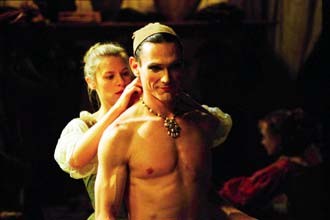|
'Stage Beauty' wanly impersonates the gender revolution in English theater Religious fundamentalism brought down the curtain on the Golden Age of English drama. Less than 25 years after the death of William Shakespeare, theater died as well. Theocratic zealots beheaded Charles I and pierced the heart of English culture by banning the production of plays. Set during the 1660s, when Charles II has recently ascended to the throne from which his father was ousted, Stage Beauty is, like The Dresser, Noises Off, and Singin' in the Rain, a backstage story that offers drama in the staging of drama. Not only have London theaters been authorized to resume their iniquities, but traditional belief that the stage is too crude a place for the fair sex is being challenged. An actor named Maria dares play Desdemona. The camera stands backstage as opening credits unroll over a performance of Othello. It is the final scene, and Maria, factotum to the famous Ned Kynaston, watches from the wings, mouthing her master's lines as he performs Desdemona's poignant death. When Ned goes off with genteel groupies, Maria rushes to another theater to perform the role of Desdemona herself. When the King, a connoisseur of female pulchritude who has adopted as his mistress the buxom, vulgar Nell Gwynn (Tapper) and wants Othello to be "cheerier," hears of this development, he approves. By royal edict, women's parts must now be played by women. A variation on A Star Is Born, Stage Beauty portrays Maria's ascendency as the first lady of the English stage through the descent of her mentor, Britain's last great female impersonator. "A woman playing a woman?" asks Ned, about the disturbing news that his protégée has appeared in public as Desdemona. "What's the trick in that?" To Ned, thespian artistry is meticulously stylized. Women playing women is a blow for the kind of Naturalism that will dominate theater and film in our own time but was alien to the era's emphasis on artificial beauty. "Without beauty, there's nothing," complains Ned, who finds himself without a role and an identity.
Stage Beauty revels in polymorphous perversity - men playing women playing men playing women, on stage and in bed. Billy Crudup's Ned is a supple, randy chameleon who is credible when, about to sleep with his first woman, he observes: "I've never slept with a woman except myself." But, ultimately, for all its Restoration rakishness, the film is an affirmation of heterosexual normalcy, in which men are men, women are women, and art is limited to showing that. •
|
Tags:

KEEP SA CURRENT!
Since 1986, the SA Current has served as the free, independent voice of San Antonio, and we want to keep it that way.
Becoming an SA Current Supporter for as little as $5 a month allows us to continue offering readers access to our coverage of local news, food, nightlife, events, and culture with no paywalls.
Scroll to read more Movie Reviews & News articles
Newsletters
Join SA Current Newsletters
Subscribe now to get the latest news delivered right to your inbox.
















